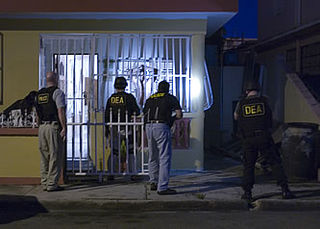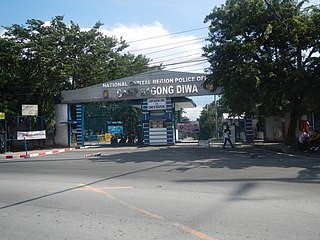Related Research Articles
In international law, a stateless person is someone who is "not considered as a national by any state under the operation of its law". Some stateless people are also refugees. However, not all refugees are stateless, and many people who are stateless have never crossed an international border. On November 12, 2018, United Nations High Commissioner for Refugees warned there are about 12 million stateless people in the world.

Villawood Immigration Detention Centre (IDC) is an Australian immigration detention facility located in the suburb of Villawood in Sydney, New South Wales in Australia.
In law, an alien is a person who is not a citizen or national of a given country, although definitions and terminology differ to some degree depending upon the continent or region of the world. The term "alien" is synonymous with "foreign national".
Peter Qasim was the longest-serving detainee in Australian immigration detention, having been detained there for over seven years. He had not been deported because he was stateless. He was detained at Baxter Immigration Reception and Processing Centre before being transferred to an Adelaide psychiatric facility.
The Bain family murders were the deaths by gunshot of Robin and Margaret Bain and three of their four children – Arawa, Laniet and Stephen – in Dunedin, New Zealand, on 20 June 1994. The only suspects were David Cullen Bain, the oldest son and only survivor, and Robin Bain, the father. David Bain, aged 22, was charged with five counts of murder. In May 1995, he was convicted on each of the five counts and sentenced to mandatory life in prison with a minimum non-parole period of sixteen years.

Australian nationality law determines who is and who is not an Australian citizen.

New Zealand nationality law determines who is and who is not a New Zealand citizen. The status of New Zealand citizenship was created on 1 January 1949 by the British Nationality and New Zealand Citizenship Act 1948. Prior to this date, New Zealanders were only British subjects and New Zealand had the same nationality legislation as the United Kingdom and other Commonwealth countries.
Robert Jovicic was a long-time resident of Australia who was deported to the Federal Republic of Yugoslavia, where he became destitute in 2005.

Norwegian nationality law is based on the principle of jus sanguinis. In general, Norwegian citizenship is conferred by birth to a Norwegian parent, or by naturalisation in Norway.

A police raid or razzia is a visit by police or other law-enforcement officers, often in the early morning or late at night, with the aim of using the element of surprise in an attempt to arrest suspects believed to be likely to hide evidence, resist arrest, be politically sensitive, or simply be elsewhere during the day.

A refugee travel document is a travel document issued to a refugee by the state in which she or he normally resides allowing him or her to travel outside that state and to return there. Refugees are unlikely to be able to obtain passports from their state of nationality and therefore need travel documents so that they might engage in international travel.
Immigration New Zealand, formerly the New Zealand Immigration Service, is the agency within the New Zealand Ministry of Business, Innovation and Employment (MBIE) that is responsible for border control, issuing travel visas and managing immigration to New Zealand.

New Zealand passports are issued to New Zealand citizens for the purpose of international travel by the Department of Internal Affairs. New Zealand has a passport possession rate of around 70% of the population and there are around 2.9 million New Zealand passports in circulation. It is ranked as one of the most powerful passports in the world.
Martin van Beynen is a New Zealand writer, print journalist, and columnist for The Press in Christchurch.

Foreign nationals wishing to enter the Realm of New Zealand must obtain a visa unless they are
Saudi Arabia has mandated a six-year cap on the residency of foreigners in the country, as part of its programme to control the local job market, and any Hajji or illegal overstayers are met with a mandatory prison sentence followed by swift deportation. Many illegal immigrants are those who have overstayed their visit, employment or Hajj visas, although there are many who sneak into the country without border staff noticing.

Albanian nationality law is based on a mixture of the principles of Jus sanguinis and Jus soli. In other words, both place of birth and Albanian parentage are relevant for determining whether a person is an Albanian citizen. It is regulated by the "Law on Albanian Citizenship". In some circumstances citizenship is granted to children born in Albania to non-Albanian parents. This is not the case where parents are temporary or short-term visitors. As suggested by the UN and Council of Europe, all efforts are made in order to avoid statelessness.
Fa'anānā Efeso Collins is a New Zealand politician who is an Auckland Councillor.

Relinquishment of United States nationality is the process under federal law by which a U.S. citizen or national voluntarily and intentionally gives up that status and becomes an alien with respect to the United States. Relinquishment is distinct from denaturalization, which in U.S. law refers solely to cancellation of illegally procured naturalization.

The Bureau of Immigration Bicutan Detention Center (BI–Bicutan) is the principal immigration detention center administered by the Bureau of Immigration of the Philippines. Located inside Camp Bagong Diwa, in Lower Bicutan, Taguig, the facility is known internally as the Warden Facility and Protection Unit (WFPU). However, in press releases and public statements, the Bureau variously refers to the facility as being a "jail", "warden facility" or "detention center". The function of the facility is to hold foreign detainees who are awaiting deportation, for example, because they have pending criminal cases, or because they have allegedly overstayed their visas.
References
- 1 2 3 4 5 6 7 Wilmsen, Steven (1992-10-17). "Angry developer sues RTC for $30 billion; Wasteful, underhanded dealings alleged". Denver Post. Retrieved 2013-01-13.
- ↑ "Mismanagement of El Paso retirement fund suspected". Denver Post. 1994-09-24. Retrieved 2013-04-01.
- ↑ "DA finds no wrongdoing in shopping center probe". The Colorado Springs Gazette. 1994-12-09. Retrieved 2013-04-01.
- 1 2 "Communication No. 1638/2007" (PDF). United Nations Human Rights Committee. 2008-10-30. Retrieved 2013-01-23.
- 1 2 3 4 5 6 Van Beynen, Martin (2011-02-14). "Overstayer gets funds". Stuff.co.nz. Retrieved 2013-01-23.
- ↑ Angie Kaminski, Internal Revenue Service (2005-11-10). "Quarterly Publication of Individuals, Who Have Chosen To Expatriate, as Required by Section 6039G". Federal Register. 70 (68511). Retrieved 2013-01-23.
- ↑ Van Beynen, Martin (2013-04-15). "Official's [sic] can't get rid of overstayer". Stuff.co.nz. Retrieved 2013-04-15.
- 1 2 3 Van Beynen, Martin (2013-04-01). "Liquidation last straw in overstayer's case - Peters". Stuff.co.nz. Retrieved 2013-04-01.
- ↑ "Business as usual at Floyds Creative Arts". Stuff.co.nz. 2010-09-09. Retrieved 2013-01-23.
- ↑ Heather, Ben (2010-04-27). "Trust link behind plan to sell liquor brands". Stuff.co.nz. Retrieved 2013-01-23.
- ↑ Van Beynen, Martin (2011-11-19). "Minister guest of overstayer". Stuff.co.nz. Retrieved 2013-01-23.
- ↑ Tan, Lincoln (13 June 2013). "Illegal alien ditches US allegiance to stay in NZ". The New Zealand Herald . Archived from the original on 12 August 2016. Alt URL
- ↑ "Case Number: 2250". New Zealand Press Council. May 2012. Archived from the original on 2013-02-05. Retrieved 2013-01-23.
- 1 2 Van Beynen, Martin (2013-03-26). "Overstayer firm put into liquidation". Stuff.co.nz. Retrieved 2013-04-01.
- ↑ Van Beynen, Martin (2013-07-08). "Overstayer fights for manor despite owing rent". Stuff.co.nz. Retrieved 2013-07-18.
- ↑ Tan, Lincoln (16 August 2013). "Probe into deportation decision: Immigration lawyers say Ombudsman's investigation could open floodgates for overstayers to gain residency". The New Zealand Herald. Archived from the original on 18 March 2016. Alt URL
- ↑ Van Beynen, Martin (2014-03-09). "The illegal 'alien' no one wants". Stuff.co.nz. Retrieved 2014-03-22.
- ↑ "-Cookie dynasty heiress: I'm being kept out of NZ because of government grudge against my husband". The New Zealand Herald. 18 May 2016. Retrieved 16 April 2018.
- ↑ Lewis, Oliver (14 April 2018). "'Legally they don't exist': New Zealand's stateless population of two". Stuff.co.nz. Retrieved 16 April 2018.
- ↑ Tasman-Jones, Jessica (2014-05-20). "Fifth gen plans sale of Dare Foods stake due to family feud". Campden FB. Retrieved 2014-05-30.